Values
Explanations > Values About values | Historical values | Research on values | So what? Values is a confusing word that often gets confused with 'value' as in the value you get from buying a cheap, but well-built house. Values are, in fact powerful drivers of how we think and behave. About values Value categories: different spheres into which we place values.
Tapping our powers of persuasion
Most psychologists will read this “Questionnaire” with Robert Cialdini, PhD. That may or may not be true, but according to Cialdini, that statement is powerfully persuasive because we tend to go along with our peers. Cialdini, who retired last year from a teaching and research position at Arizona State University in Tempe, Ariz., is a renowned expert in the science of swaying.
How walking through a doorway increases forgetting
Like information in a book, unfolding events are stored in human memory in successive chapters or episodes. One consequence is that information in the current episode is easier to recall than information in a previous episode. An obvious question then is how the mind divides experience up into these discrete episodes? A new study led by Gabriel Radvansky shows that the simple act of walking through a doorway creates a new memory episode, thereby making it more difficult to recall information pertaining to an experience in the room that's just been left behind. Dozens of participants used computer keys to navigate through a virtual reality environment presented on a TV screen.
The Science of Why We Don't Believe Science
Illustration: Jonathon Rosen "A MAN WITH A CONVICTION is a hard man to change. Tell him you disagree and he turns away. Show him facts or figures and he questions your sources.
Why Do You Have to Pee the Closer You Get to a Bathroom? - Shape Magazine
You know that terrible "gotta go" feeling that seems to get stronger and stronger the closer you get to your front door? You're fumbling for your keys, ready to toss your bag on the floor and make run for the bathroom. It's not all in your head-it's a real thing called latchkey incontinence.
The Illusion of Asymmetric Insight
The Misconception: You celebrate diversity and respect others’ points of view. The Truth: You are driven to create and form groups and then believe others are wrong just because they are others. Source: “Lord of the Flies,” 1963, Two Arts Ltd. In 1954, in eastern Oklahoma, two tribes of children nearly killed each other. The neighboring tribes were unaware of each other’s existence.
Why Love Hurts: The Sociology of How Our Institutions Rather Than Our Personal Psychological Failings Shape the Romantic Agony of Modern Life
“There is hardly any activity, any enterprise, which is started with such tremendous hopes and expectations, and yet, which fails so regularly, as love,” philosopher Erich Fromm wrote in his foundational 1956 inquiry into what is keeping us from mastering the art of loving. But why is it, really, that frustration is indelible to satisfaction in romance? At least since Jacques Ferrand’s 17th-century treatise on lovesickness, scholars have attempted to shed light on the phenomenon that has inspired the vast majority of art, music, and literature since humanity’s dawn — the pain of love. Although unrequited love and the anguish of longing have a perennial place in our experience of romantic pain, Illouz is concerned with the pain that lives within actualized romantic relationships.
Dunning–Kruger effect
Cognitive bias about one's own skill The Dunning–Kruger effect is a hypothetical cognitive bias stating that people with low ability at a task overestimate their own ability, and that people with high ability at a task underestimate their own ability. As described by social psychologists David Dunning and Justin Kruger, the bias results from an internal illusion in people of low ability and from an external misperception in people of high ability; that is, "the miscalibration of the incompetent stems from an error about the self, whereas the miscalibration of the highly competent stems from an error about others".[1] It is related to the cognitive bias of illusory superiority and comes from people's inability to recognize their lack of ability. Without the self-awareness of metacognition, people cannot objectively evaluate their level of competence. Original study[edit] Later studies[edit]
Apathy. Indifference. Lack of Compassion. – The Coffeelicious
These words, and what they have come to mean, are what will destroy our World. Let me tell you a story. There’s a lake near my Home, and I often use the trail around it to burn some calories. On one such day, I noticed a few ducks swimming in the lake. It was a beautiful sight.



